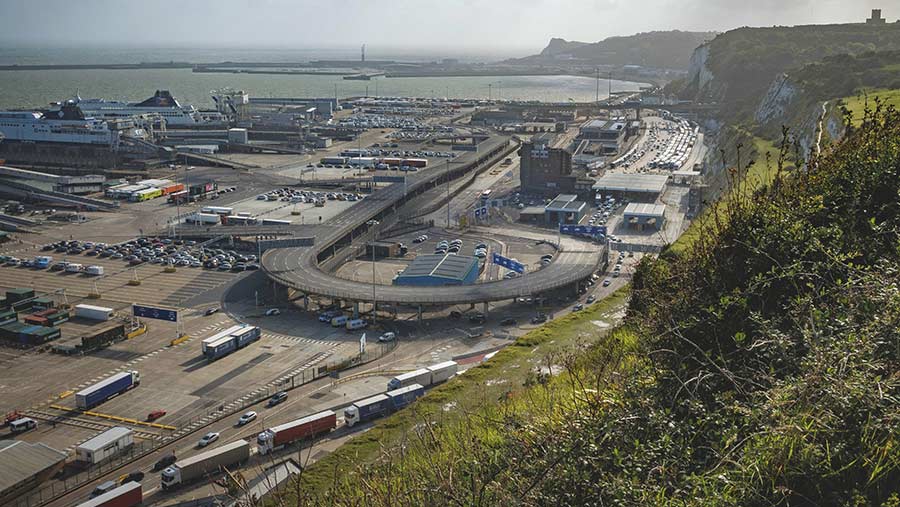Disease threat as UK waits for border control posts
 © Mathieu/Adobe Stock
© Mathieu/Adobe Stock UK agriculture is highly exposed to serious diseases imported from Europe, including African swine fever (ASF), because of a failure to get new border control posts (BCPs) operational before July 2022, a senior vet has warned.
Sanitary and phytosanitary (SPS) checks on EU goods entering Britain are yet to happen, but Defra secretary George Eustice insists ports are now at a “very high level of readiness” to achieve the new July deadline.
See also: Lack of border control points threatens breeding livestock trade
But, in the meantime, James Russell, senior vice-president of the British Veterinary Association, told a meeting of the Environment, Food and Rural Affairs (Efra) committee that he was “not comfortable with where we [the UK] are at the moment” on disease control.
“We recognise that we are exposed and that we have a biosecurity risk,” he said.
That included importing ASF, Mr Russell added. “We shouldn’t underestimate the magnitude of what ASF could do to us. It is endemic in wild boar in the forests of Germany; it is close,” he told the committee.
Inspections
Until the new BCPs are in place, goods can flow into the UK without official veterinarian and other checks, while products exported to Europe are subject to onerous inspections.
That situation, said Mr Russell, meant the UK was at a greater risk of importing disease, and there were food safety dangers, too.
“We are not in the same position we were at the end of the [Brexit] transition period. We are not sitting around the table with the EU Animal Disease Notification System – the rapid alert system for food and feed – so we are at a greater risk of importing disease than we were,” he suggested.
“We do not have the capacity within our authorities at the moment to prevent risky foodstuff coming into our country.”
An animal with bluetongue had entered the country last year and it was only picked up by chance because it broke its leg and the disease was picked up at a slaughterhouse.
“We didn’t have import controls in place, and that allowed that to happen,” said Mr Russell.
‘Stretched’
Staffing the new BCPs to carry out the relevant SPS checks presents another challenge, he warned, as vet numbers were “stretched right across the profession”. More than 90% of the vets who were responsible for official controls in UK abattoirs in 2019, pre-Brexit, were from the EU.
Even with high levels of staffing, delays at the border are a possibility from July onwards, Mr Russell said. In August 2021, a consignment of British meat entering the Netherlands through Rotterdam was delayed for four days, despite there being 145 vets in place.
From July, BCPs will be operational 24/7 for SPS checks on the key routes for perishable goods from Europe, notably Dover and Folkstone, but not at some secondary ports, where the BCPs are unlikely to be open overnight.
Welsh warning
At Welsh ports, delays in getting the relevant infrastructure in place will mean temporary measures will be needed until 2023, and that could be an issue for importers that use those ports, warn bodies representing retailers and the food and drink industry.
Andrew Opie, director of the British Retail Consortium, said he had yet to see the plans from the Welsh government.
And it is not yet clear whether goods imported from Ireland will be subject to the same level of SPS checks are those entering from other European countries.
The new UK border checks could drive up food and drink costs here, but Karen Betts, chief executive of the Food and Drink Federation, said although the risk was not “irrelevant”, other inflationary pressures that were contributing to the cost-of-living crisis “will be more significant”.
